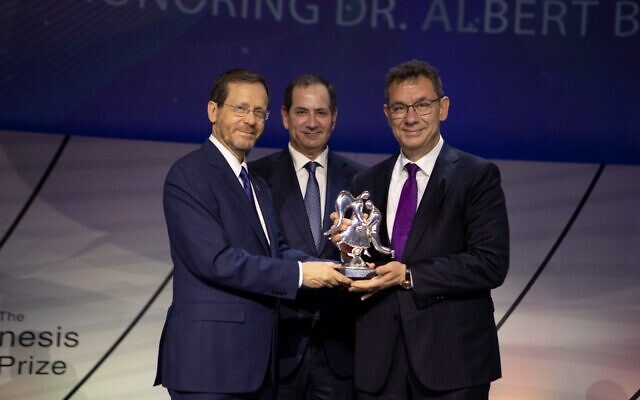2022 YIR: Bourla Honored and Criticized for COVID Vaccine Work
The Pfizer CEO received the $1 million Genesis Prize in January for his work in developing Pfizer’s COVID-19 vaccine.
Pfizer CEO Dr. Albert Bourla, whose parents survived the Holocaust on the Greek island of Rhodes, began 2022 on a high note. He received the prestigious $1 million Genesis prize in January for his work in developing Pfizer’s COVID-19 vaccine.
The Genesis award, which is sometimes described as the Jewish Nobel Prize, is an annual honor given to someone who is committed to Jewish values and has made a significant contribution to humanity. Bourla received the highest number of votes in a public campaign that included 200,000 people in 71 countries.
The award carried the commendation that Bourla had provided the “leadership and determination” to develop the vaccine by “his willingness to assume great risks.” Pfizer took on the task of developing the vaccine in partnership with the German drug development firm, BioNTech, early in the pandemic. It was the first vaccine authorized in Europe and by the FDA in the United States.
Bourla said he planned to donate the money that came with the prize to projects that help to preserve the memory of Holocaust victims, especially in Greece. Bourla’s parents were among the less than 5 percent of the Jews in the Greek city of Thessaloniki who survived the German occupation of Rhodes, which had a long and rich tradition of Jewish life.
In a statement that the Genesis Foundation released, Bourla said he was accepting the award “humbly and on behalf of all my Pfizer colleagues who answered the urgent call of history.”
Pfizer’s reputation took a strong hit on Dec. 14 when Democratic Sen. Elizabeth Warren and Senator-elect Peter Welch, a Democrat from Vermont, sent a scathing letter to Bourla. It strongly criticized the company’s plan to raise the prize of its COVID vaccine by 400 percent next year when it is released into the commercial market. In October, Pfizer announced it would be selling the vaccine for between $110 and $130 a dose. It is said to be a 10,0000 percent markup from the manufacturing cost. The government has been paying Pfizer about $30 a dose and initial pricing was expected to be around $50.
Warren and Welch called the Pfizer plan “pure and deadly greed” and accused the pharmaceutical manufacturer of “unseemly profiteering.” They pointed out that Pfizer had benefited from foundational research conducted at the National Institutes of Health and received a $1.95 billion advance-purchase agreement via the government’s Operation Warp Speed.




comments